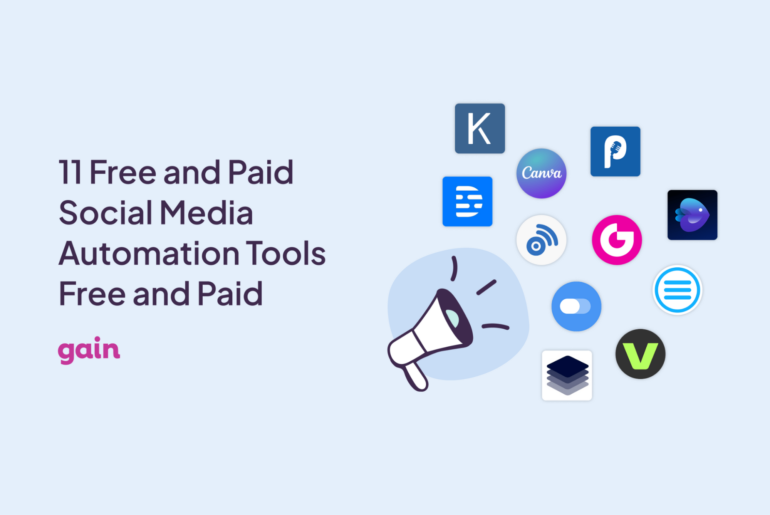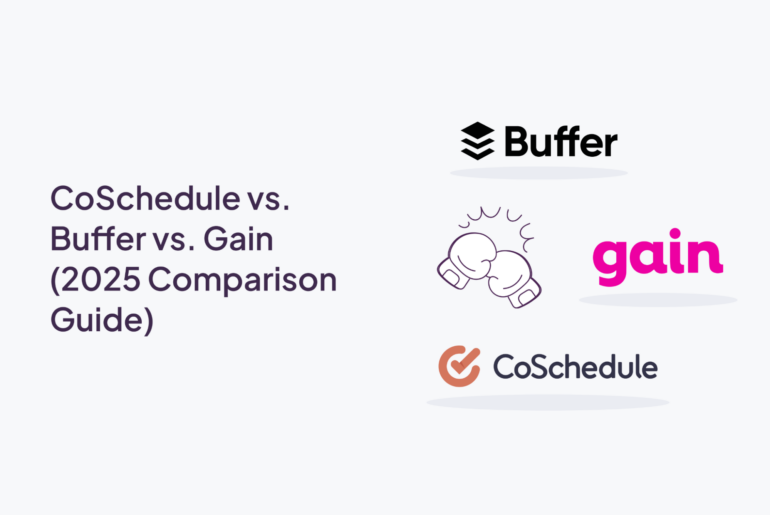You invest plenty of time in your social media marketing campaigns, which you hope to see reflected in your posts’ performance. Third-party scheduling and publishing tools, like
GAIN, are a popular aid for Facebook marketing campaigns but have been stuck with the perpetuated myth that these tools can actually decrease post reach.
Luckily, many studies, and Facebook itself, are breaking down the real effect third-party publishing tools have on post reach and debunking this myth. Let’s take a look at the facts:
Where Did This Myth Come From?
Before 2011, this myth was indeed true. Facebook’s algorithm favored native posts over posts published through external platforms. Then, in 2011, Facebook also upgraded their algorithm for better accuracy when it came to identifying high-quality content.

As more and more top-quality content was being published from third-party tools, Facebook upgraded its algorithm to ensure that audiences would not miss out on content they would enjoy.
After all, the goal of Facebook’s newsfeed is to generate more relevant content based on a user’s engagements – whether it’s likes, comments, or shares. If a Facebook user has liked Buzzfeed’s page and has engaged with their posts frequently, Facebook’s algorithm will make sure that more Buzzfeed posts appear in that user’s newsfeed more often, curating their Facebook experience. If Facebook were to continue penalizing third-party publishing services of this content, then the quality of curated content in that user’s newsfeed would be disappointing.
Studies Have Shown There Is No Difference Between Posting Natively vs. Third Party Tools
Buffer conducted an in-depth
study comparing the performance of posts published natively vs. with third-party tools over a two week period. The study concluded that the posts published through a third-party tool had a 0.6 increase in post reach.
These results show that there isn’t much of a difference between the two publishing methods. However, Buffer makes a point of noting that these results are simply anecdotal evidence. The fact that the study is anecdotal is important because these results could have also revealed that third-party publishing tools had a much greater or weaker reach during that two week period, due to variables that have nothing to do with the method of publishing.
Facebook Native Publishing:

Publishing With Buffer:


There are certain variables that do affect post reach, and these include:
- Outdated content – Scheduling topical posts for the future can result in publishing stories after they are already old news, resulting in lower engagements.
- Irrelevant topics – Posting topics that cater to your audience’s interests as well as ones that don’t will always determine each post’s performance.
- Enterprise-level tools vs. SME tools – Comparing the performance between enterprise-level publishing tools to that of publishing tools frequently used for small and medium-sized businesses produces drastically different figures, not do to the publishing tool itself, but merely due to the vast difference in audience size. Many studies attempt to compare these types of platforms and end up generating incorrect results.
There is one way that posts can perform poorly due to the use of a third-party publishing tool. An update from the
Facebook Newsroom in 2014 stated that posts that are shared implicitly could generate a negative impact on post reach.
An example of an implicit post would be auto-posting a picture from Instagram or a Pinterest pin on Facebook. These posts have no calls-to-action and generally will not engage your audience.
For Facebook posts to perform at their best, they must be curated for your target audience and include an explicit call-to-action that invites viewers to engage further.

The Pros Outweigh The Cons
The truth is, using a third-party publishing tool won’t impact the reach or overall performance of your Facebook posts. In fact, the pros outweigh the cons when it comes to using third-party tools. These tools save a considerable amount of time, effort, and help improve content creation and collaboration.
As of mid-2013, many tests have proved that Facebook no longer penalizes third-party posts. After all, Facebook works extremely hard to get businesses on the platform, and if they enacted penalties for a company’s automation efforts, they would stand to lose a large percentage of their user base. Furthermore, nothing that GAIN, or any other popular third-party tool, does violates any of Facebook’s current guidelines or publishing rules. In other words, there is nothing in the Facebook
Terms of Service that dictates companies cannot manage their pages via third-party tools.
We hope this information has shown you that third-party tools will not affect the organic reach of your posts on Facebook. If your team is ready to save a ton of time with GAIN’s collaboration automation, then
start a free demo of GAIN today.
 As more and more top-quality content was being published from third-party tools, Facebook upgraded its algorithm to ensure that audiences would not miss out on content they would enjoy.
After all, the goal of Facebook’s newsfeed is to generate more relevant content based on a user’s engagements – whether it’s likes, comments, or shares. If a Facebook user has liked Buzzfeed’s page and has engaged with their posts frequently, Facebook’s algorithm will make sure that more Buzzfeed posts appear in that user’s newsfeed more often, curating their Facebook experience. If Facebook were to continue penalizing third-party publishing services of this content, then the quality of curated content in that user’s newsfeed would be disappointing.
As more and more top-quality content was being published from third-party tools, Facebook upgraded its algorithm to ensure that audiences would not miss out on content they would enjoy.
After all, the goal of Facebook’s newsfeed is to generate more relevant content based on a user’s engagements – whether it’s likes, comments, or shares. If a Facebook user has liked Buzzfeed’s page and has engaged with their posts frequently, Facebook’s algorithm will make sure that more Buzzfeed posts appear in that user’s newsfeed more often, curating their Facebook experience. If Facebook were to continue penalizing third-party publishing services of this content, then the quality of curated content in that user’s newsfeed would be disappointing.










